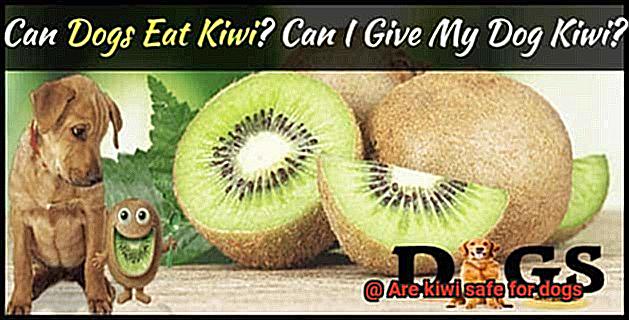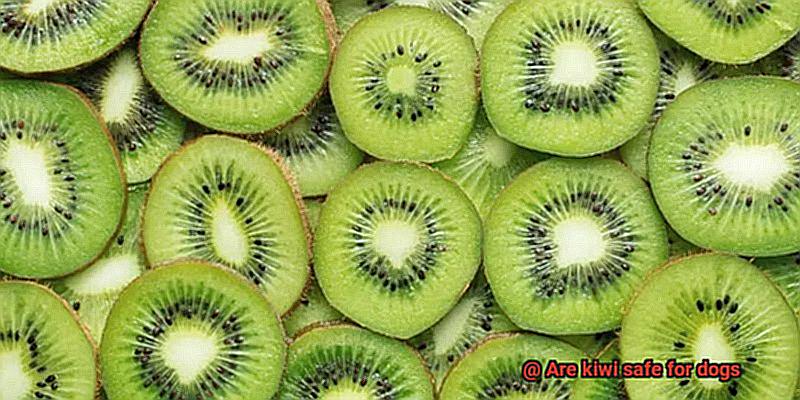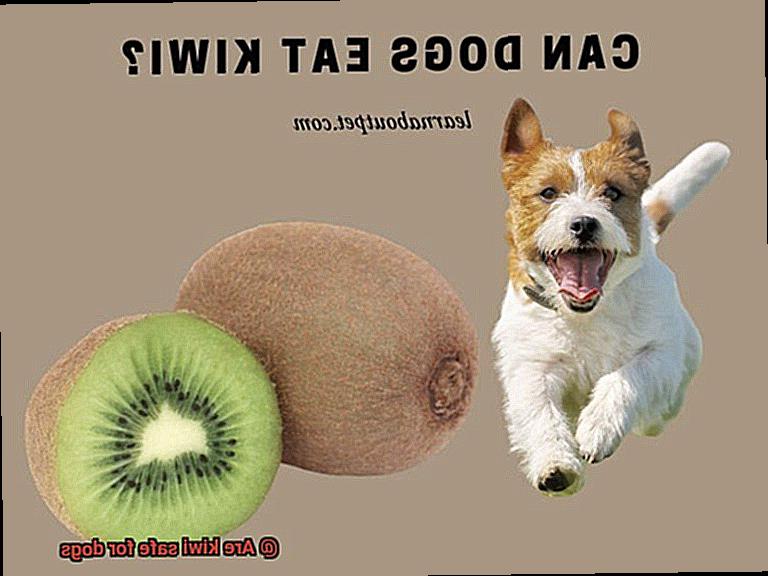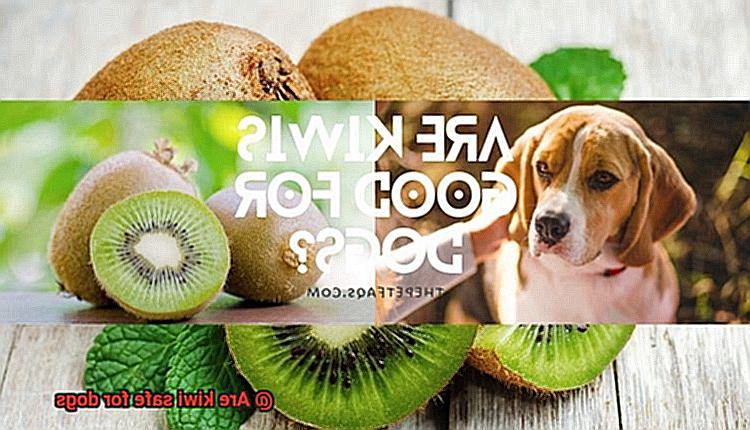Are kiwi safe for dogs?
As pet parents, we’re always on the lookout for tasty and nutritious treats to spoil our furry friends. But when it comes to sharing our human food, it’s important to know what’s safe for our four-legged companions. So, let’s dive into the question that has us all curious: can dogs eat kiwis?
These exotic fruits are bursting with essential nutrients and a tangy flavor that can make anyone’s taste buds dance. But as an expert in pet nutrition, I’ve taken a deep dive into the world of kiwis and dogs to give you the lowdown on their compatibility. Join me on this fruity adventure as we uncover whether kiwis are a safe and suitable treat for your beloved canine companion.
In the following sections, we’ll explore the potential benefits of kiwis, any risks they may pose, and how to properly introduce this furry fruit into your dog’s diet. Get ready for a juicy journey that will leave you well-informed about this delectable treat for your pup.
What are the Benefits of Feeding Dogs Kiwi Fruits?
Contents
- 1 What are the Benefits of Feeding Dogs Kiwi Fruits?
- 2 Potential Risks and Side-Effects of Feeding Dogs Kiwi Fruits
- 3 How to Properly Prepare and Serve Kiwi to Dogs
- 4 What Other Foods Should be Avoided When Feeding Dogs Kiwi Fruits?
- 5 What are the Recommended Serving Sizes for Dogs Eating Kiwi Fruits?
- 6 Is it Possible for Dogs to Develop Allergies to Kiwi Fruits?
- 7 How to Identify Signs of an Allergic Reaction in Your Dog After Eating Kiwi Fruits
- 8 Conclusion
While sticking to a balanced diet is crucial, introducing new and healthy treats can be a great way to add variety and excitement to their meals. One such fruit that can offer numerous benefits to your French bulldog is the kiwi fruit. Packed with vitamins, minerals, and antioxidants, kiwis can be a fantastic addition to your dog’s diet when given in moderation.
Immune System Boost:
The high vitamin C content in kiwi fruits acts as a natural immune booster for your French bulldog. It aids in fighting off infections and diseases, while also promoting healthy skin and coat.
Weight Management:
For French bulldogs who need to watch their weight or maintain a healthy weight, kiwi fruits are an excellent choice. Low in calories and fat, they provide a guilt-free treat option. Additionally, the fiber content aids in digestion and prevents constipation.
Heart Health Support:
Potassium, an essential mineral found in kiwi fruits, plays a significant role in maintaining proper heart function and regulating blood pressure. This mineral also supports muscle contractions and nerve impulses.
Anti-Inflammatory Properties:
Kiwis contain natural antioxidants that help reduce oxidative stress and inflammation in dogs. This is particularly beneficial for French bulldogs with joint issues or other inflammatory conditions.
Oral Health Benefits:
Studies suggest that the enzymes present in kiwi fruits may help reduce plaque buildup and prevent gum disease in dogs. Incorporating kiwis into your dog’s diet can contribute to their overall oral health.
Exciting Flavors and Textures:
Feeding your French bulldog kiwi fruits adds excitement to their regular diet. With its unique taste and texture, it provides a refreshing change from their usual meals.
Potential Risks and Side-Effects of Feeding Dogs Kiwi Fruits
While kiwi fruits can provide numerous health benefits to dogs, it is important to be aware of the potential risks and side-effects associated with their consumption. French bulldogs, like other breeds, may react differently to certain foods, so it is crucial to monitor their individual response. Here are some potential risks and side-effects to consider when feeding kiwi fruits to French bulldogs:
- Digestive Upset: Kiwi fruits are rich in fiber, which can be beneficial for dogs in small amounts. However, excessive fiber intake can lead to digestive upset, including diarrhea and stomach discomfort. It is important to introduce kiwi fruits gradually and monitor your dog’s stool consistency and overall well-being.
- Allergic Reactions: Kiwi fruits contain an enzyme called actinidain, which can cause allergic reactions in some dogs. Symptoms of an allergic reaction may include itching, hives, swelling of the face or throat, difficulty breathing, and even anaphylaxis in severe cases. If your French bulldog has never consumed kiwi fruits before, it is advisable to start with a small amount and observe any signs of allergic reactions.
- Gastrointestinal Issues: Kiwi fruits contain a natural sugar called fructose. While small amounts of fructose are generally safe for dogs, excessive intake can lead to gastrointestinal issues such as bloating and gas. Dogs have different digestive systems compared to humans, so their tolerance for certain sugars may vary. It is important to offer kiwi fruits as a treat or occasional addition to a balanced diet rather than a staple food source.
- Choking Hazard: The skin of kiwi fruits can pose a choking hazard for dogs due to its fuzzy texture and small hairs. If your French bulldog consumes the skin without proper chewing, it may cause an obstruction in the digestive tract. Therefore, it is recommended to remove the skin and seeds before feeding kiwi fruits to dogs.
- Health Conditions: Dogs with certain health conditions should avoid kiwi fruits altogether. For example, dogs with diabetes should not consume kiwi fruits due to their high sugar content. Similarly, dogs with kidney problems may need to avoid kiwi fruits because they contain a moderate amount of oxalates, which can potentially contribute to the formation of kidney stones.
It is important to remember that moderation is key when feeding kiwi fruits to French bulldogs. While small amounts can provide certain health benefits, excessive consumption can lead to adverse effects. Always consult with a veterinarian before introducing any new food into your dog’s diet, including kiwi fruits. Your veterinarian will be able to provide personalized advice based on your dog’s specific needs and health conditions.
How to Properly Prepare and Serve Kiwi to Dogs
Kiwis are packed with essential vitamins, minerals, and fiber that can benefit your dog’s health. However, it is crucial to prepare and serve kiwi properly to ensure their safety and prevent any potential digestive issues. In this article, we’ll guide you through the process of preparing and serving kiwi to your French Bulldog.
Choose Ripe and Clean Kiwis:
To start, select ripe kiwis that are soft but not mushy. Avoid any signs of mold or rot. Thoroughly wash the kiwi under running water to remove dirt and pesticides. You can also peel off the fuzzy skin if desired, as some dogs may find it difficult to chew.
Remove Seeds for Safety:
Seeds can pose a choking hazard or cause intestinal blockage in dogs. After cleaning the kiwi, remove the seeds carefully before serving.
Cut into Bite-Sized Pieces:
To prevent choking and aid digestion, cut the kiwi into small, bite-sized pieces. This makes it easier for your French Bulldog to chew and swallow.
Introduce Gradually:
Just like humans, dogs can have allergies or sensitivities to certain foods. Start by offering a small amount of kiwi as a treat and monitor your dog’s reaction before increasing the serving size.
Moderation is Key:
While kiwi can be a healthy addition to your dog’s diet, it should only be given in moderation. It should never replace their regular balanced meals and should be offered as an occasional treat.
Watch for Adverse Reactions:
After giving your French Bulldog kiwi for the first time, keep a close eye on them for any adverse reactions such as vomiting, diarrhea, or itching. If any of these symptoms occur, discontinue feeding kiwi and consult your veterinarian.

What Other Foods Should be Avoided When Feeding Dogs Kiwi Fruits?
It’s important to note that while kiwi fruits are generally safe for dogs, there are certain foods that can be harmful or toxic when consumed alongside kiwi. So, let’s dive in and uncover these potential hazards.

- Grapes and raisins: These innocent-looking fruits can actually be extremely toxic to dogs, leading to kidney failure. Even a small amount of grapes or raisins can cause serious health issues, so it’s crucial to keep them away from your furry friend when offering them kiwi fruits.
- Onions and garlic: While we humans might love the flavor of onions and garlic in our dishes, these ingredients contain compounds that can damage a dog’s red blood cells and lead to anemia. So, be sure to check the ingredients of any food you’re considering giving to your dog along with their kiwi treat.
- Chocolate: Ah, chocolate, the sweet temptation that dogs should never indulge in. Chocolate contains theobromine, which is toxic to dogs. Even small amounts can cause symptoms like vomiting, diarrhea, increased heart rate, and even seizures. Keep any chocolate-containing products far away from your dog when offering them kiwi fruits.
- Avocado: While the flesh of ripe avocado is generally safe for dogs in small amounts, the skin, pit, and leaves should be avoided as they contain higher levels of a substance called persin, which is toxic to dogs in large quantities.
- Xylitol: This sugar substitute might be a sweet alternative for us humans, but it can be deadly for our furry friends. Xylitol is commonly found in sugar-free products like gum, candy, and baked goods. It can cause a rapid release of insulin in dogs, leading to a sudden drop in blood sugar levels, which can be life-threatening.
- Alcohol: This one should go without saying, but alcohol should never be given to dogs. Even small amounts can be toxic and cause symptoms like vomiting, diarrhea, difficulty breathing, and even coma. So, keep those alcoholic beverages and foods far away from your dog when offering them kiwi fruits.
- Caffeine: Just like chocolate, caffeine is also toxic to dogs and can cause restlessness, increased heart rate, tremors, and even seizures. So, make sure to keep any caffeinated products out of reach when giving your dog delicious kiwi treats.
What are the Recommended Serving Sizes for Dogs Eating Kiwi Fruits?
Today, we’re going to talk about the recommended serving sizes for our furry friends when it comes to indulging in delicious kiwi fruits. But before we dive into the juicy details, let’s take a moment to appreciate the importance of a balanced and paw-some diet for our beloved Frenchies.
As responsible dog parents, we all want what’s best for our four-legged companions. That means providing them with a well-balanced diet that meets their unique nutritional needs. While kiwi fruits can be a tasty and healthy addition to your Frenchie’s menu, it’s crucial to remember that moderation is key. So, let’s explore the recommended serving sizes together.
Start Small: Introducing Kiwi Fruits to Your Frenchie’s Menu

Just like humans, dogs have different dietary requirements. That’s why it’s essential to introduce kiwi fruits gradually into your Frenchie’s diet. Begin by offering a small piece of kiwi and observe how your furry friend reacts. Keep an eye out for any sensitivities or allergies that may arise – after all, we want only tail-wagging happiness.
Slice it Right: Recommended Serving Sizes for Your Frenchie
Now, let’s get down to the nitty-gritty of serving sizes. For small to medium-sized Frenchies, it is recommended to offer 1 to 2 slices of kiwi fruit per day. C’est parfait. For our larger Frenchie friends, you can pamper them with slightly more – up to 3 to 4 slices per day. Remember, we’re aiming for a healthy balance here, so let’s not go overboard and risk tummy troubles.
Prep with Love: Safety First for Your Frenchie
When preparing kiwi fruits for your Frenchie, safety is of the utmost importance. Remove the skin and seeds, as they can pose a choking hazard or cause digestive issues. Cut the fruit into small, bite-sized pieces that are easy for your Frenchie to chew and digest. After all, we want their kiwi treat time to be both enjoyable and safe.
Consult the Experts: Veterinarian Advice for Your Frenchie
We all know that our Frenchie friends are unique individuals with specific needs. That’s why it’s always a paw-some idea to consult with your veterinarian before making any changes to your furry friend’s diet. They can provide personalized guidance tailored to your Frenchie’s individual needs and ensure that their health is in tip-top shape.
Remember, Treats are Just Desserts: The Role of Kiwi Fruits in Your Frenchie’s Diet
Is it Possible for Dogs to Develop Allergies to Kiwi Fruits?
French Bulldogs, like any other breed of dog, can develop allergies to certain foods, including fruits like kiwi. While it may not be a common allergen for canines, it is still possible for your furry friend to have an adverse reaction to this tropical fruit.
Why Do Dogs Develop Allergies to Kiwi?
Allergies occur when a dog’s immune system mistakes a harmless substance, in this case, kiwi, as harmful. The immune system then launches an attack to protect the body, leading to allergic symptoms. The proteins found in kiwi fruits are often the culprits behind these allergic reactions in dogs.
What Are the Symptoms of Kiwi Allergies in Dogs?
The symptoms of a kiwi allergy in dogs can vary from mild to severe. Your French Bulldog may experience itching, redness, or swelling of the skin. They may also show signs of gastrointestinal upset, such as vomiting or diarrhea. In some cases, respiratory issues like coughing or sneezing may occur. Severe allergic reactions can lead to anaphylaxis, a life-threatening condition that requires immediate veterinary attention.
How Can You Determine if Your Frenchie is Allergic to Kiwi?
If you suspect your French Bulldog may be allergic to kiwi, it is essential to consult with your veterinarian for a proper diagnosis. They may recommend performing an elimination diet or conducting allergy tests to pinpoint the specific allergen.
How Can Kiwi Allergies in Dogs be Managed?
The most effective way to manage kiwi allergies in dogs is by avoiding exposure to kiwi fruits and any products that contain them. Make sure to read ingredient labels carefully and steer clear from giving your Frenchie any treats or foods that contain kiwi.
In some cases, your vet may prescribe antihistamines or other medications to help manage the symptoms of an allergic reaction. However, it’s important to note that medication should only be used under the guidance of a veterinarian.
Preventing Accidental Exposure to Kiwi Allergens
As a responsible dog owner, it is crucial to be aware of your pet’s potential allergies and take necessary precautions to prevent accidental exposure to allergens like kiwi. Keep kiwi fruit out of your Frenchie’s reach and inform friends and family members about your dog’s allergy to ensure they don’t accidentally give them any kiwi treats.
How to Identify Signs of an Allergic Reaction in Your Dog After Eating Kiwi Fruits
While it’s tempting to offer them a taste of everything, it’s important to be aware of potential allergic reactions. In this article, we will explore how to identify signs of an allergic reaction in French bulldogs after eating kiwi fruits.
Skin Reactions:
Watch out for any changes in your French bulldog’s skin after eating kiwi fruits. Itching, redness, swelling, and hives may indicate an allergic reaction. Take note of any rashes or bumps that appear on their skin as well.
Gastrointestinal Symptoms:
Keep an eye on your French bulldog’s digestive system after they’ve eaten kiwi fruits. Vomiting, diarrhea, or signs of abdominal pain may suggest an allergic reaction. These symptoms can occur within hours of consumption.
Respiratory Issues:
Pay attention to your French bulldog’s breathing patterns after they’ve had kiwi fruits. Coughing, wheezing, difficulty breathing, or sneezing could be signs of an allergic reaction. If you notice any of these symptoms, seek immediate veterinary care.
Anaphylaxis:
In rare cases, French bulldogs may experience a severe allergic reaction called anaphylaxis. This life-threatening condition requires immediate medical attention. Look out for extreme swelling, difficulty breathing, pale gums, weakness, or collapse. If you suspect anaphylaxis, rush your French bulldog to the vet right away.
Contact Your Veterinarian:
If you notice any signs of an allergic reaction in your French bulldog after eating kiwi fruits, contact your veterinarian for guidance. They will provide appropriate treatment options and help determine if your dog is indeed having an allergic reaction to kiwi or if there could be another underlying cause.
6l8tXM1kzS8″ >
Conclusion
In conclusion, it is important to consider the safety of our furry friends when it comes to feeding them kiwi.
While kiwi can be a healthy and nutritious snack for humans, it may not have the same benefits for dogs. Kiwi contains a high amount of natural sugars and fiber, which can be difficult for dogs to digest.
Additionally, the seeds and skin of kiwi can pose a choking hazard or cause intestinal blockages in dogs. It is always best to consult with your veterinarian before introducing any new food into your dog’s diet.
Your vet will be able to provide personalized advice based on your dog’s specific needs and dietary restrictions.




